Did you know that antidepressants are one of the three most commonly used therapeutic drugs in the United States? In fact according to the Centers for Disease Control and Prevention (CDC), about 1 in every 8 Americans over the age of 12 has taken antidepressants within the last month. While antidepressants are used to effectively manage the symptoms of depression and other conditions, it is important to note that they can also affect dental implant treatment.
A recent study performed by a University of Buffalo School of Dental Medicine doctor of dental surgery (DDS) candidate Sulochana Gurung found that antidepressant use increased the risk of implant failure by four times. The study, titled “Association Between Antidepressant Use and Implant Failure: A Pilot Study”, followed 74 dental implant patients from January 2014 to August 2014. The exposure group were those who had reported antidepressant use and the control group were those who had no history of antidepressant use. A total of 6 participants experienced implant failure and it was found that 33% used antidepressants. Only 11% of patients who did not experience implant failure had a history of antidepressant use.
The final conclusion of this study was that antidepressants can increase the risk of implant failure by four times and each year of antidepressant use doubled the risk of implant failure. The evidence obtained during this study suggests that antidepressants can interfere with the success of dental implants, however it was also stated that additional research was needed to confirm this relationship between the two.
At this point, you may be wondering just how antidepressants can affect dental implants. To explain how antidepressants affect dental implants, we must first look at how antidepressants work. The majority of antidepressants work by managing serotonin levels. While many people assume that serotonin receptors are only found in the nervous system, they are actually also found within the digestive, cardiovascular, and skeletal systems. This ultimately means that the use of antidepressants can affect these systems in addition to the nervous system.

While this is still being researched, it is believed that the side effects associated with antidepressants are responsible for implant failure. One main side effect of antidepressants is their ability to decrease bone metabolism regulation. This is because serotonin is directly involved in bone metabolism. Serotonin receptors are found on both osteoclasts and osteoblasts. Osteoclasts are cells responsible for dissolving bone, while osteoblasts are cells responsible for forming new bone. There have been studies that indicate serotonin levels can inhibit osteoblast production, meaning that it slows down new bone growth.
A key element of dental implant success is the implant’s ability to fuse with the surrounding bone. In order for fusion to occur, however, new bone must grow around the implant to secure it in place. In cases where osteoblast production has decreased, this can cause a slow recovery process and can increase the likelihood that the implant will fail. Additionally, antidepressants can produce alternate side effects such as bruxism and dry mouth, both of which can increase the risk of implant failure.
However, this does not necessarily mean that just because you have a history of antidepressant use that you should not get dental implants. In fact, there are a few things that can be done in order to minimize the risk. Other research shows that there is a link between vitamin D and dental implants, specifically that adequate vitamin D levels can increase the chances of implant success. Other studies show that calcium and magnesium are not only good for general health, growth, and repairing cells and tissues, but that they can help promote bone growth when taken with vitamin D. Additionally, magnesium and vitamin D are believed to be beneficial for treating the symptoms of depression as well.
Overall, the exact relationship between antidepressant use and dental implant failure is still being researched. Although preliminary research indicates that there may be a possible link between the two, this does not exclude people with a history of antidepressant use from having dental implant treatment. It may mean, however, that additional precautions or supplements may need to be taken in order to increase beneficial treatment outcomes.

